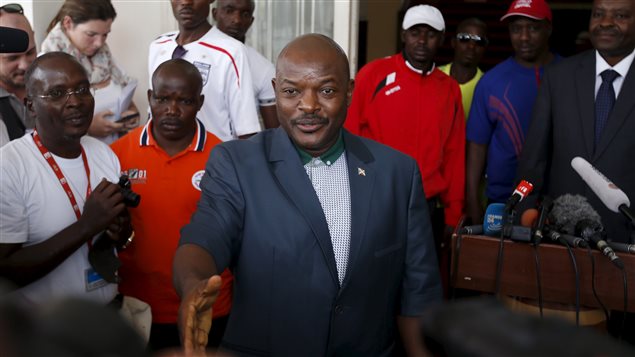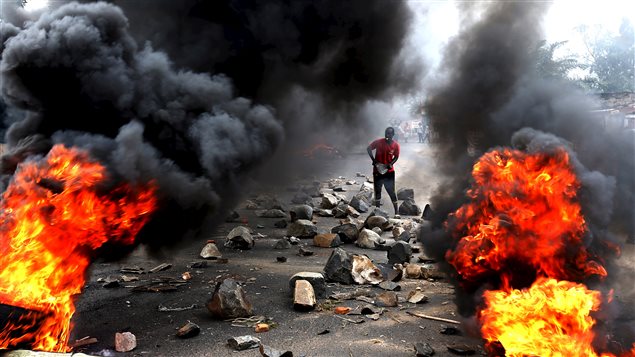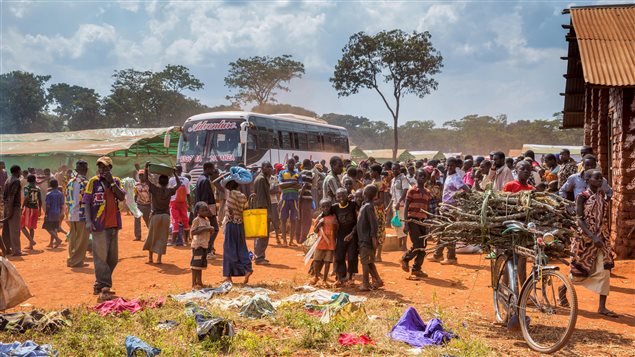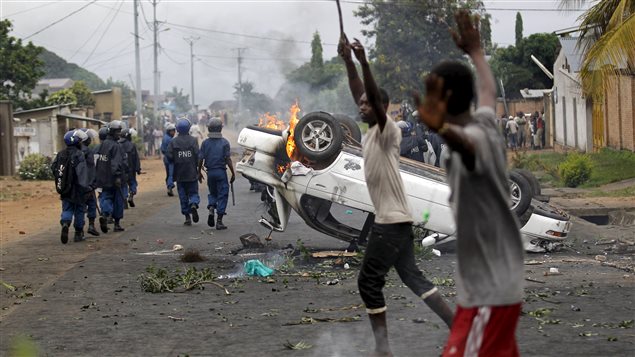The African Union (AU) says it is prepared to send 5,000 peacekeepers to protect civilians in Burundi amid continuing unrest that has killed at least 400 people and forced more than 220,000 Burundians to flee to neighbouring countries, sparking fears the country is on the brink of a Rwanda-style genocide.
The proposal to deploy the peacekeeping force – even without the government’s consent – was approved by the AU’s Peace and Security Council but will need to get the backing of the UN.
Last Thursday the AU declared it would not allow genocide to take place in Burundi.
However, the government of President Pierre Nkurunziza has warned that it will consider the deployment of AU troops without its consent “an attack” on Burundi.
Rita Abrahamsen, professor in the Graduate School of Public and International Affairs at University of Ottawa and an expert on African politics, said the AU’s readiness to deploy a peacekeeping force even without the government’s consent is an indication of how serious the situation in Burundi is.
(click to listen to the interview with Prof Rita Abrahamsen)
Listen“This is the first time that the AU has said that it will send troops to a country without the consent of the government,” Abrahamsen said speaking on the phone from Ottawa. “Given the way in which the AU operates, with a large degree of African consensus, stressing consensus and unity, this is a very clear sense that the AU is very, very concerned that the conflict in Burundi might escalate and become something very much more serious than what we’ve seen to date.”

Unrest in Burundi began in April when President Nkurunziza announced he would seek a third term in office. The announcement sparked protests in the capital Bujumbura, and then military a coup attempt in May. Despite the unrest, in July Nkurunziza – a former Hutu rebel leader and sports teacher – went on to win a third term in disputed elections described as “a joke” by the opposition.
“At the heart of it, it is a political conflict, it is a conflict over the president’s decision to curtail and restrict democratic freedoms,” said Abrahamsen. “As such it is not yet an ethnic conflict: it’s a conflict over democracy, over political freedom and divisions are not as of yet between Hutus and Tutsis, it’s between supporters of the president and opponents of the president.”
Just like Rwanda, its neighbour to the north, Burundi is split between two ethnic groups: the Hutus, who make up about 85 per cent of the population, and the minority Tutsis, making up the rest.
And the fear is that in a country like Burundi, which just like Rwanda has had a bloody history of ethnic violence, the conflict between the political elites will turn into an ethnic conflict very quickly, Abrahamsen said.

“Historically it takes very little for a conflict to move into an ethnocized conflict,” Abrahamsen said. “It can occur quickly, it can occur by political elites deliberately manipulating the anxieties of the people.”
Since the peace agreement in Burundi in 2000, the political importance of ethnicity has decreased and there has been a high degree of peace, but ethnic origin remains the underlying division in the world’s second poorest country, she said.
And there are growing indications that political elites on both sides are starting to manipulate these ethnic divisions, Abrahamsen said.
“When we look at the history of Rwanda, at the history of Burundi it is that kind of creation of fear that ‘if we don’t act as a group, then the other group will act,'” she said. “And clearly one of the risks at the moment is that one of the groups will go down that route.”
Regional complexity

The situation in Burundi is further complicated by the highly fluid and complex international situation in the region, with instability and old conflicts feeding off each other in neighbouring Democratic Republic of Congo and Rwanda, and to a certain extent Uganda. She said the conflict in Burundi has the potential of becoming a wider regional conflict.
“I don’t want to make that a scary scenario, because we need to be careful here as well,” Abrahamsen said. “The more we talk about it becoming an ethnic conflict, the more we talk about it becoming a regional conflict, maybe we are also stirring those flames.”
In the meantime, the violence that has followed Nkurunziza’s controversial re-election has caused international condemnation, including by Canada.
“Canada is deeply concerned by the escalating violence and incidents of brutality reported in Bujumbura in recent days,” Canada’s Foreign Affairs Minister Stéphane Dion said in a statement on Dec 13. “We are also alarmed by the high number of victims killed under circumstances that remain unclear. These violent acts and the ongoing repression that continues to violate human rights must stop.”
Ottawa also advised all Canadians to leave the country.








For reasons beyond our control, and for an undetermined period of time, our comment section is now closed. However, our social networks remain open to your contributions.